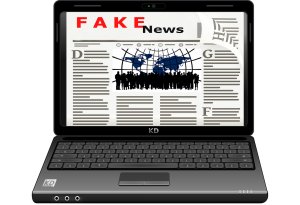
When breaking news unfolds and competing news outlets try to get the story out as fast as possible, how can we be sure as news consumers that those stories are accurate and have sufficient context?
How do we find the truth when there is so much information and news being shared 24/7?
How can we tell the difference between neutral journalism and opinion, especially now that digital technology makes it possible for anyone to publish anything, worldwide?
When the news challenges our own core beliefs, how do we overcome bias to get to the truth?
These are necessary questions when we talk about being news literate. When we talk about news literacy, we're referring to our ability as news consumers to use critical thinking skills to judge the reliability -- and credibility -- of news reports. However you get the news - whether print, online, or social media, we can argue that society functions better when we have reliable information for which to base our decisions and actions.
Over the last few months, the Central Library has been offering our series of workshops focused around news literacy. The goal of these workshops has been to help participants exercise their own power as citizens by becoming perceptive and informed news consumers. In our time together, we've focused on how to find the reliable information needed as news consumers to make informed decisions, take action, make judgments, and responsibly share information online. At a time when information and disinformation is spread each day, non-stop, our workshops seek to help us understand the differences between fact and rumor, news and promotion, news and opinion, bias and fairness, assertion and verification, and evidence and interference.
The steps towards being news literate come with a lot of challenges. For one, the news can, and is, overwhelming at times! With so much access to news literally any time we want, it's much easier now to feel inundated with negative news. It's no surprise that breaking stories focusing on tragedy, disaster, political upheaval, paparazzi-like reporting on well-known celebrities with a hawk-eye attention to misfortunes or stumbles. As author and Harvard University Professor Steven Pinker described poignantly in his title, Enlightenment Now, "Consumers of negative news, not surprisingly, become glum: a recent literature review cited "misperception of risk, anxiety, lower mood levels, learned helplessness, contempt and hostility towards others, desensitization, and in some cases, ... complete avoidance of the news."
Along with negative feelings, this can also lead to an immediate need to share what news we strongly feel one side or the other on, and as you can imagine, there can be major consequences for sharing news that may not be telling the whole truth or worse, no truth at all. And news consumers can't rely on popular social media platforms like Facebook, Instagram, Twitter, and YouTube to stop allowing the creation of fake accounts that spread fake content, despite their claims to improve these efforts.
As one of the facilitators of these workshops who consumes news on a daily basis, my biggest recommendation to news consumers is that it is always worth taking the time to deconstruct the news. Based on our workshops, whether you are evaluating a tweet, an Instagram photo, or a viral video, the following steps will help you decide what is valuable:
Step 1: Summarize the main points, comparing headline to the story.
Step 2: Is the evidence direct or indirect?
Step 3: Evaluate the sources
Step 4: Does the reporter make his or her work transparent?
Step 5: Does the reporter place the facts and the story in context?
Step 6: Are the key questions answered (Who, What, When, Where, Why, and How)
Step 7: Is the story fair?
In our last two workshops for the year, we'll be talking about how the above steps can be applied to digital-age media, from social media posts to viral videos and websites, and we'll wrap up by recapping our understanding of news literacy and applying those tips and tools in today's information-non-stop world.
News Literacy: Where Are We? Where Do We Go From Here?
Community Learning Center Classroom, Central Library
- Tuesday, December 17, 2019, 1:00 pm - 2:30 pm
- Thursday, December 19, 2019, 6:00 pm - 7:30 pm
If you've missed our earlier workshops, fear not! We will be repeating our series again in early Spring of 2020 with fresh curriculum and real-world, current examples of why news literacy matters. We hope you can take part in these important conversations!


Add a comment to: Recap of our News Literacy Workshops in 2019